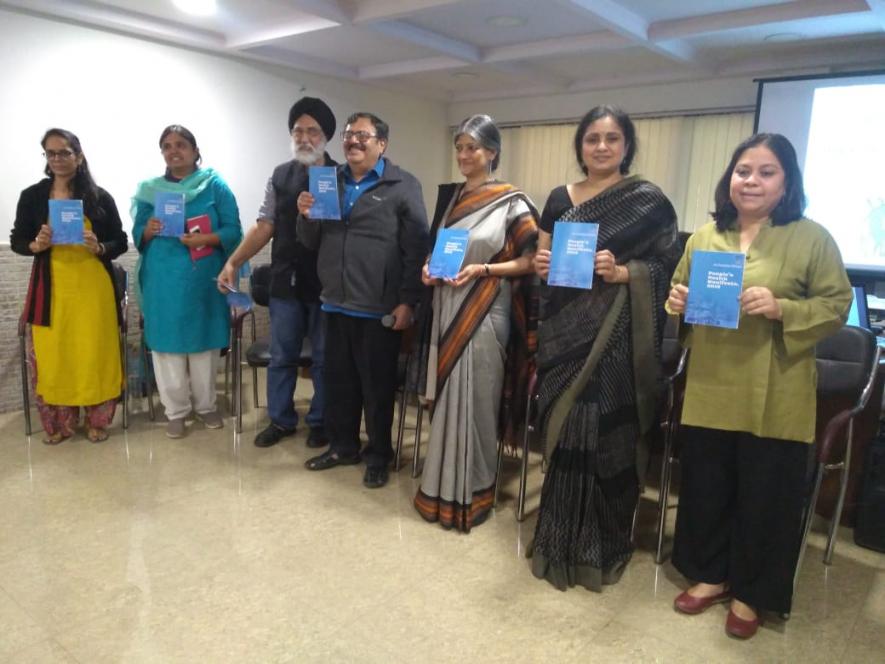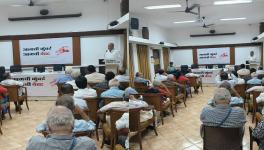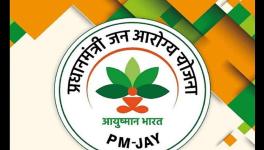JSA Releases Manifesto For People’s Health Towards The 2019 Elections

As the 2019 Lok Sabha elections come round the corner, the People’s Health Movement India — the Jan Swasthya Abhiyan — a platform of networks and organisations fighting for people’s right to health and universal access to healthcare in the unprecedentedly privatising ecosystem of healthcare and medical rights — released a People’s Health Manifesto.
Abandoning the Ayushman Bharat health insurance scheme—based on the discredited ‘insurance model’—and increasing public health expenditure to 3.5 per cent of the GDP in the short-term are among the main demands of the People’s Health Manifesto released by the Jan Swasthya Abhiyan (JSA) on 25 February 2019.
The manifesto raises the most worrying concerns plaguing the health sector and proposes concrete actions that can be acted upon by the political parties for the upcoming parliamentary elections.
The JSA has demanded that the governments “increase substantially the public expenditure on Health, financed primarily through general taxation, to 3.5% of GDP (this would be annually around Rs. 4,000 per capita, at current rates, as recommended by the National Health Policy-2017) in the short term, and 5% of GDP in the medium term, with at least 60% of the expenditure being borne by the Centre and 40% by states.”
The manifesto has asked that the government ensure that out of pocket spending on health which is currently stratospherically high be brought down, till it becomes less than one-fourth of total health care expenditure.
It spoke of the need for decentralization of fiscal relations between the Centre and States, so that states face lesser financial constraints as caused by centralization of fiscal powers at the Centre.
Also read: https://www.newsclick.in/ayushman-bharat-not-answer-indias-health-needs
“The Centre must commit to contributing significantly to paying for the additional human resources.”
The manifesto pointed out: “For example, contrary to claims, an additional Rs.1200 crores has not been allotted for the Health and Wellness Centres and this amount will be deducted from the budget for the National Health Mission (NHM), and states will have to bear additional financial burden forcing more exclusion.”
“This would betray the commitment of the National Health Policy 2017 to shift from the highly selective primary health care which was imposed as part of health sector reforms in the nineties towards a comprehensive primary health care.”
The much-hyped Ayushman Bharat health insurance scheme—call it the Pradhan Mantri Jan Arogya Yojana (PMJAY) or the National Health Protection Scheme (NHPS)—that is being sold as the answer to all of India’s health needs, is based on the discredited ‘insurance model’, such schemes “involving major participation of the private sector in service delivery”, there being enough surveys and evidence of their ineffectiveness and the massive exclusions caused by them and how they have only filled up private coffers.
The JSA has demanded that the NHPS along with other state insurance schemes be absorbed into a substantially expanded and strengthened publicly funded healthcare system.
“The projected annual outlay of Rs. 12,000-50,000 crores, as per different estimates would be much better utilized by investment in expansion of public facilities and creation of permanent public assets. Absorb existing publicly funded health insurance schemes (RSBY and different state health insurance schemes) into an expanded and strengthened public health system,” reads the manifesto.
The release of the manifesto in Delhi was marked by speakers—economist Jayati Ghosh from JNU, Dipa Sinha from the Right to Food Campaign, Ravi Duggal from the People’s Budget Initiative, N Sarojini from JSA, Abhay Shukla from JSA Maharashtra, Sunita Singh from JSA Uttar Pradesh, and Sulakshana Nandi from JSA Chhattisgarh.
Prof Jayati Ghosh from JNU discussed the impact and experiences of adopting the private insurance system, arguing that it will forever deprive the future generations from accessing good quality healthcare.
“Our focus should be on public delivery of healthcare. If we do not demand this investment now, we shall be trapped in the most inefficient method (privatisation) of healthcare provision in the world,” she said.
Ravi Duggal talked about the downsizing of the National Health Mission and the larger public healthcare system, demanding an immediate increase in the investment in the public health sector.
Sarojini from WeAreSama spoke of the urgent need to regularise contractual health workers (ASHAs) while providing them with humane working conditions as well as social security.
As the manifesto reads, “Regularise all contractual health workers, including ASHA, Anganwadi and helpers involved in delivery of public health services and ensure that they receive protection from the entire range of labour laws.”
Also read: https://www.newsclick.in/40-years-alma-ata-declaration-health-all-still-far-cry
“All levels of public health system staff shall be provided with adequate skill training, fair wages and placement and all provisions of social security and decent working conditions.”
The other demands include making “the right to healthcare a justiciable right through the enactment of appropriate legislations both at Centre and State levels”, which should pave the way to healthcare becoming a fundamental right in the Indian Constitution.
The manifesto also demands effective regulation of the private medical sector — “modify the National Clinical Establishment Act 2010 to ensure observance of patient’s rights; regulation of the rates and quality of various services; elimination of kickbacks for prescriptions, diagnostics and referrals; and grievance redressal mechanisms for patients.”
It says all states must adopt the national Act or a state-specific act incorporating the features of the national legislation.
“Expand and strengthen the public healthcare system to ensure quality and availability of health care appropriate to primary, secondary and tertiary level, entirely free of user fees and provide, universal access to the entire range of essential drugs and diagnostics at the public facility with a matching human resource policy and much better governance and management,” says another demand-cum-proposed action.
It demands increase in public investment in education and training of all levels of health personnel to ensure capacity building in government-run colleges. “Establish a well governed and adequate public health workforce by creating adequate numbers of permanent posts.”
“Put in place stringent mechanisms for regulation of all existing private institutions, such as medical and nursing colleges, in a transparent manner and place a moratorium on the establishment on new private medical colleges or charging of capitation fees. Overhaul the Medical Council of India (MCI) and the Nursing Council of India along democratic lines to eliminate corruption and unethical practices. Allow state specific rules and processes for recruitment of candidates that combines merit and transparency in selection and finds appropriate candidates for working in difficult areas,” says the manifesto.
Also read: https://www.newsclick.in/unholy-nexus-trumps-public-health
It also demands that the government adopt a scientific and pro-people pharmaceutical policy, incorporating the following points:
• Bring all essential medicines and their analogues as well medical devices under price control through a system of price fixation based on manufacturing cost.
• Ban all irrational medicines and irrational Fixed Dose Drug combinations
• Effectively regulate and eliminate unethical marketing by adopting legal Uniform Code for Pharmaceuticals Marketing Practices.
• Adopt a rational pharmaceutical policy covering drugs, vaccines, diagnostics, and medical devices and equipment.
• Promote opening of generic medicine outlets in adequate numbers. The government should prepare a Generic medicine policy that would make it mandatory for manufacturers to prominently display the generic name (rather than brand) as main labelling for all products, and for doctors to use generic names in all prescriptions, while ensuring easy availability of generic medicines
• Use the public health safeguards in the Indian Patent Act to promote access to medicines, Protection should be provided against patent misuse and Compulsory Licenses should be for local manufacturer of patented medicines. Build innovation eco-systems that actively promote drug and diagnostic innovation to ensure that the diagnostics and therapies required to address our changing health needs particularly for orphan diseases.
• Public pharmaceutical industries and vaccine manufacturing units should be strengthened, rather than being privatized.
Get the latest reports & analysis with people's perspective on Protests, movements & deep analytical videos, discussions of the current affairs in your Telegram app. Subscribe to NewsClick's Telegram channel & get Real-Time updates on stories, as they get published on our website.
























